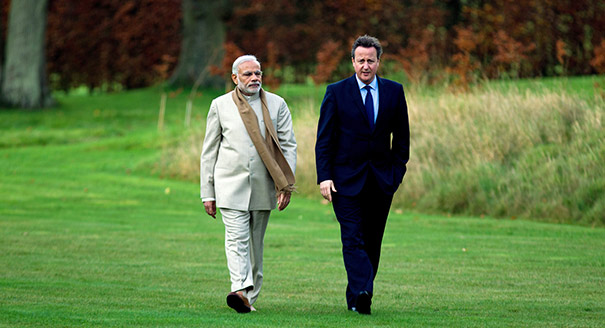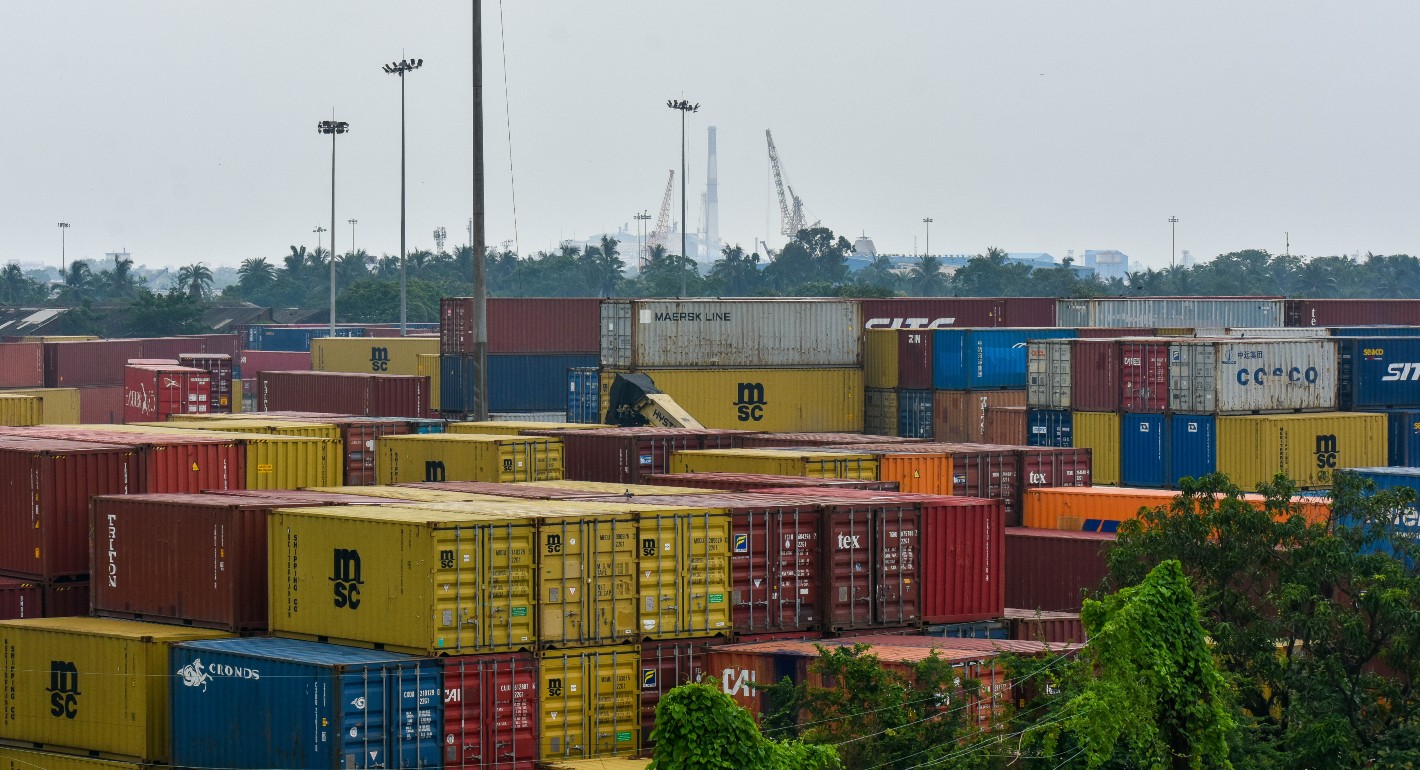C. Raja Mohan, Darshana M. Baruah
{
"authors": [
"C. Raja Mohan"
],
"type": "legacyinthemedia",
"centerAffiliationAll": "dc",
"centers": [
"Carnegie Endowment for International Peace",
"Carnegie India"
],
"collections": [],
"englishNewsletterAll": "",
"nonEnglishNewsletterAll": "",
"primaryCenter": "Carnegie India",
"programAffiliation": "SAP",
"programs": [
"South Asia"
],
"projects": [],
"regions": [
"South Asia",
"India",
"United Kingdom",
"Western Europe"
],
"topics": [
"Foreign Policy"
]
}
Source: Getty
Britain Could Join India in a Maritime Coalition
As one of the world’s largest economies with an expeditionary military tradition and deep resources of soft power, Britain can be a productive and long-term partner for a rising India.
Source: World Today
Reconnecting Britain to its old economic partners in the Commonwealth is one of the ideas that animated the Brexit movement. A strong partnership with India may not be a substitute for Britain’s continued engagement with Europe, but it must form an important element of London’s new international strategy.
If the UK can overcome the threat of Scottish secession and survive as a state, it will remain an important player in world affairs. As one of the world’s largest economies with an expeditionary military tradition and deep resources of soft power, Britain can be a productive and long-term partner for a rising India.
In Delhi, Narendra Modi, the prime minister, appears to have a special empathy for the Anglo-Saxon world. Unlike many of his predecessors from the Congress Party, who were suspicious of the United States and sneered at Britain, Modi has embraced America and is eager to revive ties with Britain and other parts of the English-speaking world.
This opens the door to two possibilities. One is the revival of the Commonwealth and the other is the construction of an expansive India-centred democratic maritime coalition in the Eastern Hemisphere with America’s strong support and Britain’s participation.
In the UK, there is no dearth of sceptics who see restoring the imperial connection as a delusion, while in India, there is little nostalgia for the Empire. But Modi, the first leader born after India’s independence, has less of an anti-imperialist chip on the shoulder. He has broken many political taboos inherited from the Congress party, taken a fresh look at India’s role in the world before independence, including its participation in the two world wars and appears more open to reviving the Commonwealth.
While independent India has sought membership of every global club, it has looked down on the Commonwealth as a colonial legacy, largely because of British blunders in India in the inter-war period and the misreading of the Second World War by the Indian national movement.
After the war, Britain saw the Commonwealth and a strong political, economic and military partnership with India as a critical element in sustaining its international role. If Jawaharlal Nehru’s refusal to accept a military role for the Commonwealth in preference for non-alignment and an emphasis on state-led socialism diminished Britain’s great power aspirations, they also limited India’s international prospects.
A rejuvenated Commonwealth, under shared leadership between Delhi and London, can help Britain maintain its international presence and help India’s rise to leading power status. Reviving a club of disparate states, from the South Pacific to the Caribbean and southern Africa to South East Asia, would be demanding but it is never too late. Consultations between India, Britain, Canada and Australia would be an important start.
The second step in building a new coalition in the East, a continuation of the Anglo-American maritime tradition, should be easier. Despite President Obama’s advice to remain in Europe, it is unlikely that Washington will want to abandon its special relationship with London. In fact, many Republicans have welcomed Brexit.
At a time when India’s prominence is rising in America’s global strategic calculus, it is not difficult to imagine Britain as an essential part of a maritime coalition in the Indo-Pacific. Recently Washington has given focus and money to the idea of building a democratic bloc in the region involving America, India, Australia and Japan. Britain would fit nicely into America’s Asian rebalance.
Although a natural partner for the West in the post-war world, independent India chose to experiment with alternative paths. The Non-Aligned Movement came to a naught during the Cold War, and Delhi’s dalliance with Moscow and Beijing in its quixotic quest for a multipolar world since then has seen India diminish at the expense of China.
Modi is more ambitious than his predecessors but faces a growing challenge from an assertive China. It is no surprise then that Modi has embraced the idea of a maritime coalition with the US, Japan and Australia and he should have no hesitation in drawing Britain into this alliance. But as a leader, who has inherited Gujarati pragmatism as well as a maritime orientation and who understands the sources of India’s vast footprint in the English-speaking world, he is well-placed to lay a new foundation for it.
About the Author
Former Nonresident Senior Fellow, Carnegie India
A leading analyst of India’s foreign policy, Mohan is also an expert on South Asian security, great-power relations in Asia, and arms control.
- Deepening the India-France Maritime PartnershipArticle
- Shanghai Cooperation Organization at Crossroads: Views From Moscow, Beijing and New DelhiCommentary
- +1
Alexander Gabuev, Paul Haenle, C. Raja Mohan, …
Recent Work
Carnegie does not take institutional positions on public policy issues; the views represented herein are those of the author(s) and do not necessarily reflect the views of Carnegie, its staff, or its trustees.
More Work from Carnegie Endowment for International Peace
- Modernizing South Asia’s Borders Through Data-Driven ResearchArticle
Cargo time release studies offer a path to greater economic gains and higher trust between neighboring countries.
Nikita Singla
- Europe on Iran: Gone with the WindCommentary
Europe’s reaction to the war in Iran has been disunited and meek, a far cry from its previously leading role in diplomacy with Tehran. To avoid being condemned to the sidelines while escalation continues, Brussels needs to stand up for international law.
Pierre Vimont
- India Signs the Pax Silica—A Counter to Pax Sinica?Commentary
On the last day of the India AI Impact Summit, India signed Pax Silica, a U.S.-led declaration seemingly focused on semiconductors. While India’s accession to the same was not entirely unforeseen, becoming a signatory nation this quickly was not on the cards either.
Konark Bhandari
- How Far Can Russian Arms Help Iran?Commentary
Arms supplies from Russia to Iran will not only continue, but could grow significantly if Russia gets the opportunity.
Nikita Smagin
- Is a Conflict-Ending Solution Even Possible in Ukraine?Commentary
On the fourth anniversary of Russia’s full-scale invasion, Carnegie experts discuss the war’s impacts and what might come next.
- +1
Eric Ciaramella, Aaron David Miller, Alexandra Prokopenko, …














